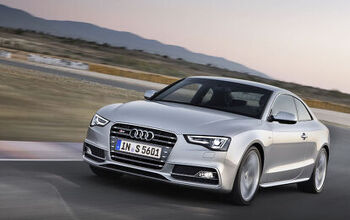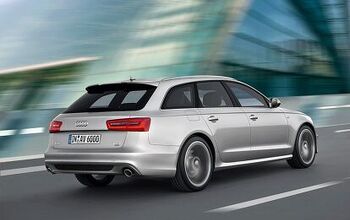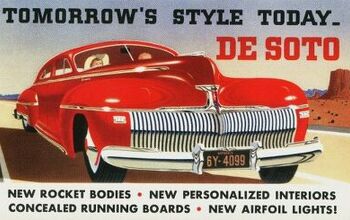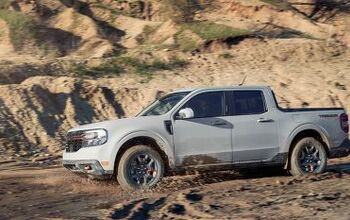2 Views
What's Wrong With This Picture: Crazy 'bout Elvis Edition
by
Robert Farago
(IC: employee)
Published: April 11th, 2009
Share
Robert Farago
More by Robert Farago
Published April 11th, 2009 5:27 PM


































Comments
Join the conversation
Blunozer: As much as I loooove to debate the failure of GM... As I have with anyone who thinks they have half a clue... Go pick up the John Z Delorean book called, "On a Clear day you can see GM." This little book... details their FAILURES at the TOP MOST LEVEL of this b.s company from 30-45yrs ago. Ya dont actually think this all just popped up in the 80s? Nah to be this stupid, ya really have to work at it. And that.. they did. See the "New GMC Terrain" for that, look towards the TB and its copies, and the Equinox for more evidence of failures, in management, in execution, in sales, in marketing.. AND look at the copy over at Pontiac.. FOR BRAND DILUTION.
What's with all this EV1:FAIL talk? Perhaps GM spin was stronger than I anticipated... Fact of the matter is, GM caved under internal and external factors and killed the EV1 program. It was a setback for GM, both then and now. Regardless of whether or not the car would have sold (truth is, probably could have - early customer feedback was off the charts) -when GM pulled it plug, it severely hurt alternative energy engineering development within GM and in the possible suppliers that could have supported a 'leaner', 'meaner', and dare I say it - 'greaner' GM now. O, and let's not forget about the aforementioned infrastructure as well. If you're in NYC this week, check out the NYAS - it may be the last time you see GM and Chrysler there.
Rev Junkie : First of all, the EV1 was DEFINITELY NOT the future. At most, with the NiMH batteries, not the golf-cart lead-acid battteries, it got 100 miles per charge, and it took eight hours to recharge. That is what is known as regression, you moron. And even the more conventional energy miser Insight didn’t sell because it had ONLY TWO SEATS. Remember that the Insight and EV1 both followed an era when there were tons of two seaters. Honda Del Sol, Honda CR-X, Toyota MR-2, Pontiac Fiero, Mazda Miatas, Mercury ??? (that two seater Aussie Ford 'vert), the Geo Metro 'vert and then the whole list of European two seaters in an earlier era (Karmann Ghia, Porsche 914, MG, Austin Healey, etc but still seen as the occasional daily driver in the 1990s). No, I don't think two seats is or was a problem. We did experience a shift towards large vehicles during that same period which ended the two seaters for a while. I remember a lot of people saying how they were going to buy something larger b/c the other vehicles on the road had gotten so large. Otherwise they liked their tiny two seaters. I certainly did. I'd like to think a return to our senses is right around the corner but until gas prices go back up... No I'm not hoping for high pump prices – just a return to some sense. Just no point in driving a ~6,000 vehicle to haul a ~250 lb person to the corner store for milk... Save that HD vehicle for the family vacation trip. And of course, Detroit never wants to change. Yes, if it wasn’t for the damn guv-mint, we’d still all be riding around in ‘67 Chevelle hardtops with carbureted big-blocks and Powerglide transmissions. And choking on the lead-gasoline fumes/smog. The problem is that Detroit seldom leads – they have to be dragged forward into modern vehicle standards. Not saying they are the only ones but they make the most noise when new standards are proposed. Detroit has offered some WONDEFUL concept cars that introduced us to all sorts of new technology but essentially the new family sedan we have today is just like the family sedan of 1985. The fuel injection is better, the crash protection is better but the features – much the same. I recently drove a 1989 Volvo for a few days. Nice car. Only difference between it and the modern cars is it had ABS and airbags then and they are common now in more pedestrian vehicles. Is that Detroit making advances or is that the gov't pushing them? Having driven a lot of vehicles from the Model-T and up I'm glad that safety standards have evolved away from gas tanks behind the pickup truck seat, plate glass replaced by safety glass, crumple-zones, and pollution controls. Yes the easiest examples of some of these technologies were pretty sad examples of modern technology (shock absorber bumpers and early feedback carbs) but the mature examples of these technologies are nice. That said I would be plenty happy with a well engineered vehicle that did not include airbags and ABS. EidolWays : One problem is, of course, the repeated accusation that the EV1 was the future and GM killed it. No, the thing never hit the market or even had the potential of turning a profit as it was. Much as with any true electric car today, range and infrastructure are an issue. A tiny car with no range will not appeal to most people, and if something can’t turn a profit… Well, as you’re all saying here, it should die. The infrastructure is there in every 220V outlet. My house has three. I just added one to the garage for my MIG welder for less than $50 The fact is there are a huge number of people who don't exceed the range of the original NiMH powered EV1. Yes, there are a large number of folks who could not live with an EV but not MOST people. Most people could live with a daily range of 100 miles. Stan Ovshinsky said that the NiMH EV1 prototype he delivered to GM would go 245 miles per charge. Thanks – I'll take a large investment in renewables to offset the fossils with rooftop solar across the nation and a fleet of EV vehicles on the side. Look – every gallon I don't burn means there is another for the diehard fossil fuel consumer to use up. Lowers the price. We can run nukes to satisfy the baseline grid demand and then supplement with solar and wind with hydro and mtn top pump lakes to back it up. Use breeder reactors to minimize waste, maximize fuel efficiency. Require all new home and business construction to have at least a minimum rooftop solar. Standardize the solar panel interface so that people can easily expand the rooftop arrays with mixed panel brands as their budget and interest in solar allows. Require commercial businesses to have a certain amount of solar on their big flat roofs too – count the number of big box retailers across the country – okay? How much could their rooftops be generating? Give some thought to how much money goes out of our economy into the oil producing countries around the globe. And then how much we send to China who is only marginally happy with us. Happy to build our retail crap but also gearing up to build a very capable military to protect themselves from us... Big picture. Long term thought. FWIW I'm shopping for an EV-bike conversion kit (the choices are endless). I'll be biking to work twice or three times a week. Will make my bike more practical and safer than it is right now when I bike. ~20 mph for ~20 miles. More pedaling = more speed and range if I choose. Aiming at exercise and losing a little weight. Costs 5 cents to recharge at the end of the day. Batteries cost less to replace than any trip to a mechanic for anything fixed on an average vehicle. Working towards building a full EV out of my second car unless the car manufacturers begin to sell something before I need to replace the engine. My car lasts longer, no gasoline consumption when I bike and believe it or not bike stats say that biking is safer than being a pedestrian. So what if everything goes electric? Buses and trucks can use pantographs for power from overhead cables. So can trains. Reserve diesel fuel consumption for off-road situations. Big picture. Long term planning. Careful thought. My government isn't going to do it but my family will do plenty of these babysteps in the right direction over the next few years so that if the **** hits the fan we are still able to do what we need to do. Lead by example. Talk is cheap. If people see other people going down a different path, then they can SEE what is a viable choice. Don1967: Hyundai and Subaru have been growing their market share throughout the oil price bubble and the economic meltdown, and they did it without any goofy golf carts. Have been wondering for some time if the GM “mistakes” were designed to collapse the company gently so they could shed overhead costs (labor, pensions, etc) quietly and semi-legally so they could be better prepared for the rise of Chinese and Indian vehicles on the American markets. Detroit could survive the Europeans in the 1950s/60s. They could survive the Asians. And the Koreans. Could they survive the arrival of the Chinese and Indians? Perhaps Detroit is preparing for higher fuel prices which will drive Americans to smaller cars long term – or encourage the Europeans to return their products to the American market. There would be a lot of competition with the Europeans, Japanese, Koreans, Chinese and Indians all selling cars here. Any room left for Detroit products that the consumer believed to be marginal? How many more consumers will jump the Detroit ship just to try out the new (future) imports? Surely the guys at the top have much smarter people than us armchair engineers and much longer term outlooks using data unavailable to us? Perhaps all of the apparent confusion and BS the folks at the top use during interviews are designed to reassure the consumers while giving nothing to the competition??? Surely they SAY they don't know the competition's products while quietly knowing everything about the competition??? GM/Ford/Chrysler needs to reorganize so that even the lowliest products turn at least a little profit. Anything else is putting all of their eggs into one basket. MrDot : GM did completely botch hybrids. I agree that the mild-hybrid system was a good idea that should have been a place-holder marketed as XFE models while new drivetrains were being developed rather than being sent-up against the Prius. Except for the fact they make very little on the smallest compacts – the mild hybrid system would have done well in an Aveo where the small power difference would have been most noticeable... Perhaps it would have given those products another 6-8 mpg putting them nearer 40 mpg... Rev Junkie: Electric cars are good for city-dwellers, because the range problem is not as big of an issue. But until they find a way to get a fairly compact battery that can get at least a 400 mile range, enough for a day’s driving on an interstate trip without taking longer than a night’s sleep so the car is ready to go the next day, the range problem is still there. Why would you travel long distance in an EV? If we owned TWO EVs right now I'd either keep a used (cheap) minivan in the garage for trips or rent one – or fly. Electric vehicles are not going to REPLACE gasoline powered vehicles anytime soon but they can supplement them TODAY. Get them to market and let the technology mature over the next two decades. Why do electric vehicles need to match gasoline vehicle performance before they are viable? The only thing not viable about them is the fact that the existing business model perfers to gather the revenue created by customers replacing their complicated gasoline powered vehicles every 125K miles and requiring a lot of maintenance along the way. Of course the vehicle lasts much longer than 125K miles but somewhere along the way the type of person buying the well-used used-vehicle no longer desires to utilize the dealer services or OEM parts. They want cheap and they might get their brother-in-law to fix it when it breaks. First the early adopters will buy the electric vehicles and then a few skeptical friends/family/neighbors will watch and get charmed by them and then over time ordinary people will buy them as second cars, or something for their kid to drive assuming they aren't worth $40K or expensive to maintain. Eventually a few people will brag they replaced both of their vehicles with electrics just like some folks brag now that they have decided they don't want to own a vehicle at all - a great money saver I'm sure! Remember all the modern gadgets – cellphones, computers, PDAs, MP3 players? They were rich people's toys at first and then the price came down while the battery got better and the features went up. The same thing will happen with the electric vehicle. First a rich main's grocery getter with rich men's grand tourers later and affordable electric cars for ordinary people like me even later. I guess the Fisker luxury sedan/coupe/thing will appeal to rich people who don't go far but want electric drive and all the lux. That said I could drive a 125 mile range EV all the way to Grandma's house across the state and charge overnight before returning home no sweat. My commute this morn was 7 miles. My commute for the next 20 years will be if everything remains constant about 10 miles each way even with allowances errands. That leaves me 80+ miles in a 100 mile range EV to go to the store suddenly, out to the movies, to Cub Scouts, back to work for some sort of emergency call, etc. Every day. Most battery systems I've looked at charge rapidly at first so much of the range is recovered quickly. My wife's commute for the next 20 years if everything remains constant is about 60-70 miles round trip even with shopping, picking up the kids, and all that. We're working on finding her something closer. She could come by my workplace and swap cars if she needed the other 80 miles of range left in my battery or perhaps her employer would entice her to stay at that job by adding a charging outlet. Why wouldn't an electric vehicle work for us? Running down the mental list of the dozens of friends and family and coworkers – I can think of perhaps 3 I know that couldn't drive an EV everyday as the tech exists NOW. The ~250 mile range supposedly right around the corner would even take care of those three as well. YMMV... This might not be true of all of you – you might live in the snowy north or commute through hell every morning and afternoon but it works for a lot of us. Nobody is going to make you drive one so why the resistance? At my house we talk about taking constant baby steps in the right direction to achieve our goals. Education. Budget. Maintenance. Purchasing quality that lasts and can be repaired. It looks like Detroit has been taking babysteps backwards my entire life. One step forward, two steps back. What worries me is when I ponder whether I think America as a whole is doing the same thing...
What's wrong is that some of the external factors are actually internal and vice versa 1. Foreign competition should not read asian makers make quality cars, it should read more desirable cars. 2. Excess liquidity should be about how the domestics flooded the market with discounted cars at low rates. That's the reason there are too many cars out there, and most of the excess are domestic. 3. The labor related issues are as much external as internal. The unions got too much leverage from state and federal laws and actions.